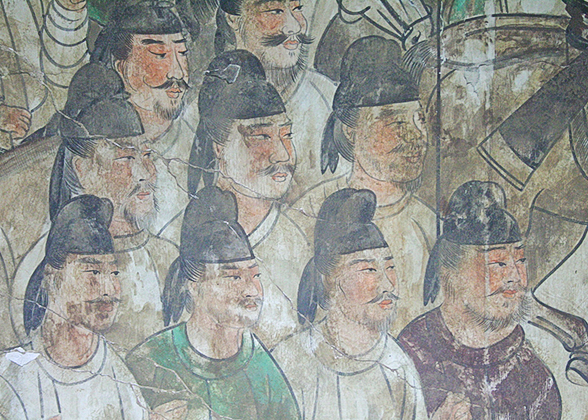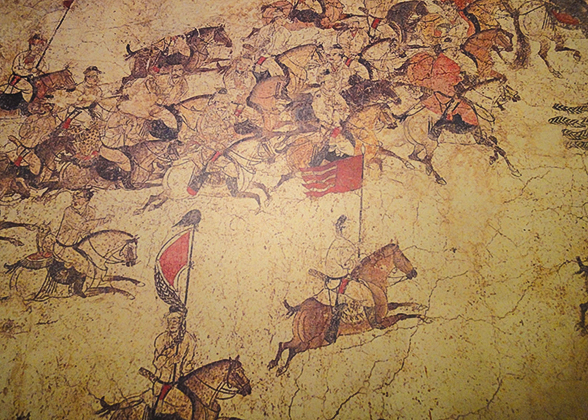The Shaanxi History Museum in Xi'an, regarded as 'the pearl of ancient dynasties and house of Chinese treasures', gives a miniature overview of the thousands of years of Chinese history and the splendid ancient cultures of olden times.
Situated on Xiaozhai East Road on the northwest side of Giant Wild Goose Pagoda, the Shaanxi History Museum is the first modern national museum. It was built in 1983 and opened to the public in 1991. Shaanxi History Museum covers 65,000 square meters (16 acres), of which 11,000 square meters (207 acres) belong to the exhibition halls and 8,000 square meters (about 2 acres) are used as warehouses for storing relics. Now 370,000 exhibits in the museum vividly show the history of over a million years from prehistoric times (1,150,000 years ago - 21st Century BC) to about 1840 AD.The grand buildings of Shaanxi History Museum imitate the architectural style of the Tang Dynasty (618 - 907) with a two-storied central hall and four worship halls around it. The predominant colors of the halls are black, white and grey, which give the halls an atmosphere of solemnity and rustic charm.The exhibition halls of Shaanxi History Museum
are generally divided into four main groups; the Preface Hall, the permanent exhibition halls, the temporary exhibition halls, and an exhibition hall for Tang Mural Paintings. Once you enter the central hall, you will be in the Preface Hall, where stands a replica of a stone lion from the Shunling Tomb of the Tang Dynasty and a huge picture of a loess plateau and the Yellow River. Behind the picture you will find the permanent exhibition halls.Permanent Exhibition Halls in Shaanxi History Museum shows the Shaanxi's culture in the timeline in three exhibition halls separately.
It shows
the history of Prehistoric Times (1,150,000 years ago - 21st Century BC), Western Zhou (1046 - 771 BC) and Qin Dynasty (221 BC-206 BC). Different original cultures are mainly shown in prehistoric times. In the Western Zhou and Qin Dynasty areas, the origin and arising of these two dynasties are covered. 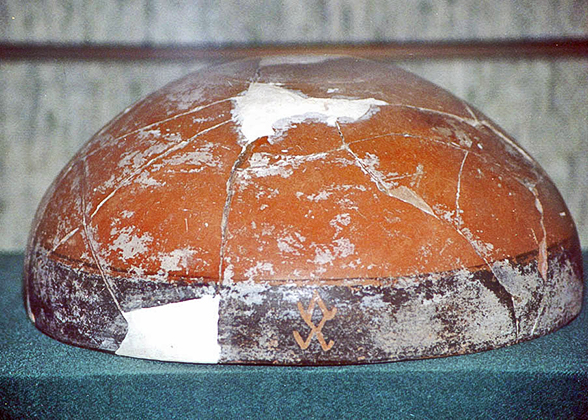 | | Bowl with Engraved Symbols | | 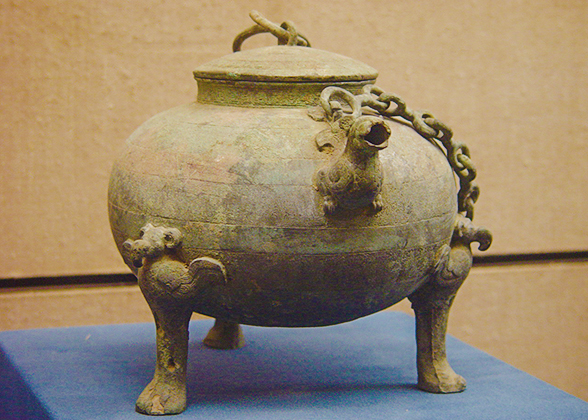 | | Bronze Drinking Vessel | |
It shows the history from the
Han Dynasty to the
Northern and Southern Dynasties (386-589). In the Han Dynasty, grand architecture and the cultural exchange with other countries are interesting. Everlasting wars and cultural integration are the main themes of the North and Southern Dynasties.
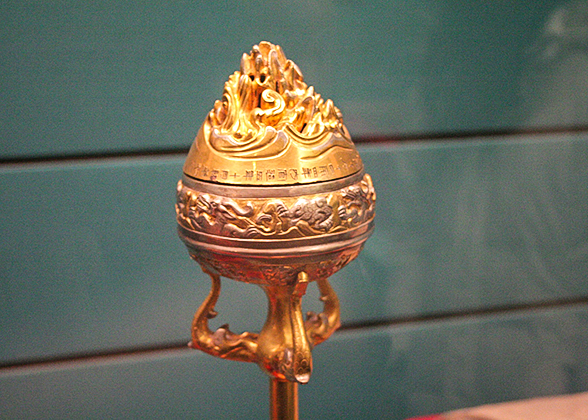 | | Silver and Gold Bamboo-shaped Incense Burner | | 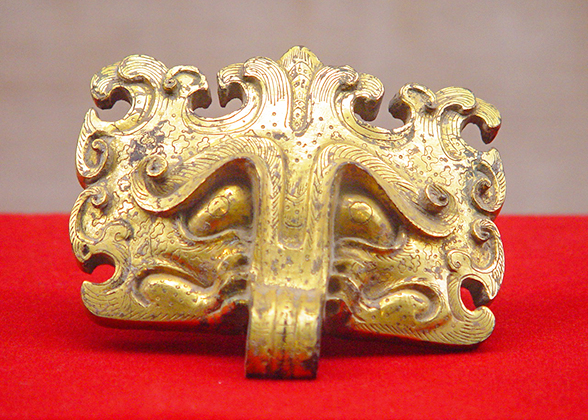 | | Gilt Bronze Knock-Holder | |
It covers the history of the Tang Dynasty and later years. The Tang Dynasty was the heyday of China and Shaanxi Province; so many different kinds of relics covering almost all aspects are shown in this section. You can see splendid gold and silver articles, tri-color glazed pottery, and articles related to the Silk Road in this hall. After the Tang Dynasty, although Xi'an lost its position as the capital city of China, it was still an important place. There are many relics that show its continuing importance.
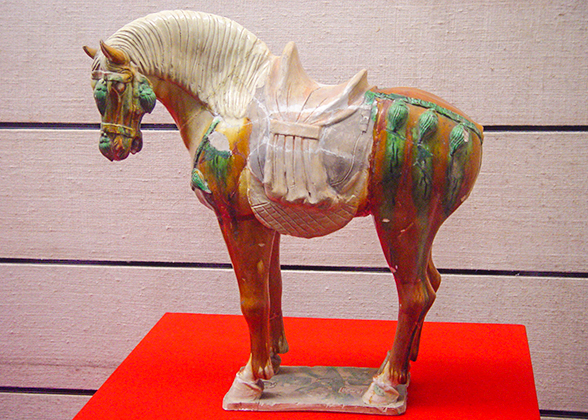 | | Tri-colored Horse of the Tang | | 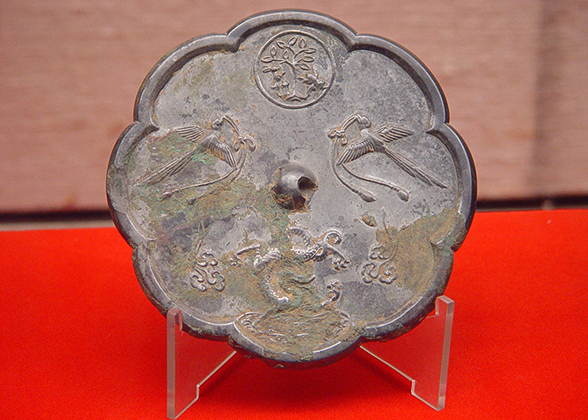 | | Bronze Mirror of Tang Dynasty | |
These treasures, being shown in one of the temporary hall, were unearthed from Hejia Village, Xi'an, Shaanxi Province. Besides, there is the other hall which is usually features a variety of theme exhibitions.
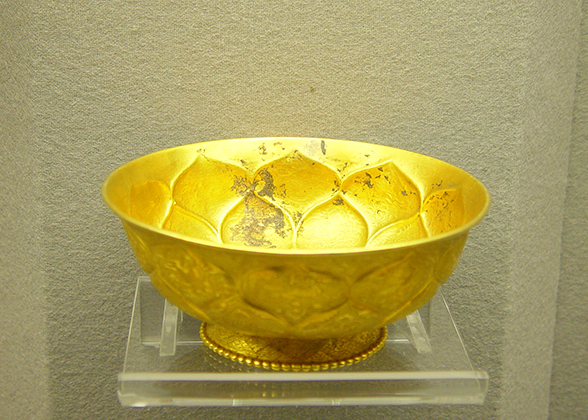 | | Golden Bowl with Lotus Patterns | | 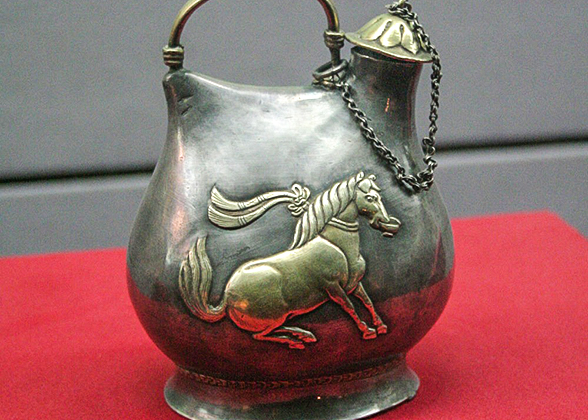 | | Gold-coated Dancing Horse Silver Pot | |
It is the most distinctive collection in the museum. The hall, lying on the first floor below ground, occupies 1,000 square meters and stores 600 mural paintings from more than 20 noble tombs of the Tang Dynasty. These painting describe different aspects of the noble classes in the Tang Dynasty, depicting how people lived during that time. Other related relics and painting in other dynasties are also shown as companions for the paintings so that visitors can understand the development of the murals. For additional information there is an inquiry system and electronic explanation system provided enabling you to not only enjoy the fantastic murals but also get some background knowledge. This hall is open to the public on an occasional basis per week.
Exhibition Hall of Tang Murals & Stone Coffins
Besides, another exhibition hall, focusing on 5 pieces of Tang Murals and stone coffins from Jingling Mausoleum, was open to the public in 2013 in Shaanxi History Museum. Jingling Mausoleum is the tomb of Zhenshun Empress of Emperor Xuanzong during the Tang Dynasty (618-907), Lilongji. The coffin from her tomb, formed by 31 pieces of beautifully carved stones, weighs 27 tons and is about 2.5 meters long. It looks like a small stone palace. It is currently the biggest and best preserved coffin among the more than 20 unearthed coffins from the Tang Dynasty. The New Branch of Shaanxi History Museum on Qin & Han Civilizations
Located in Qinhan New City and close to the protected cultural relics Qin Xianyang City Site, the newly-built Qin Han Museum of Shaanxi History Museum is jointly built by Qinhan New City and Shaanxi History Museum. The new museum has a total land area of about 11.3 acres, over four times bigger than its mother museum. The interior is divided into five exhibition halls with an exhibition area of about 11,300 square meters (2.8 acres).
Shaped by seven main buildings which are arranged according to the Big Dipper stars and connected by glass corridors, it boasts with a cluster of Qin-style architecture. Both designed by the famous architect Zhang Jinqiu, the two museums’ styles and temperaments echo.
 Opening time for trial operation: 09:00 – 17:00, last entry at 16:00 and closed on every Tuesdays except public holidays.
Opening time for trial operation: 09:00 – 17:00, last entry at 16:00 and closed on every Tuesdays except public holidays.
 Open Areas: Exhibition Hall of Qin & Han Culture
Open Areas: Exhibition Hall of Qin & Han Culture
 Admission fee: free, enter without tickets during the trial operation
Admission fee: free, enter without tickets during the trial operation
 Location: East Section of Lanchi 3rd Road, Qinhan New City of Xixian New Area, Shaanxi
Location: East Section of Lanchi 3rd Road, Qinhan New City of Xixian New Area, Shaanxi
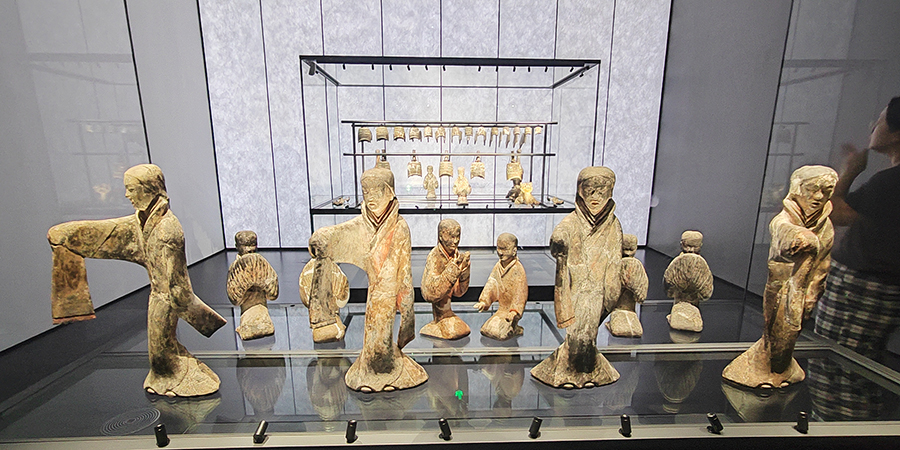 |
| Pottery Figurines in the New Branch of Shaanxi History Museum |
How to Get There
How to get to Shaanxi History Museum in Xi'an City Center
Take Bus No. 26, 271, 701, 5, 19, 24, 30, 34, 400, 401, 521, 527 and get off at Shaanxi History Museum.
to Xiaozhai Station, and exit from Exit D. Then, walk east along East Xiaozhai Road around 800 meters (0.5 miles) to get there.
Take Metro Line 3 to Dayanta Station. And then walk west along East Xiaozhai Road for about 800 meters to reach.
- Last updated on Oct. 07, 2024 by Gabby Li -
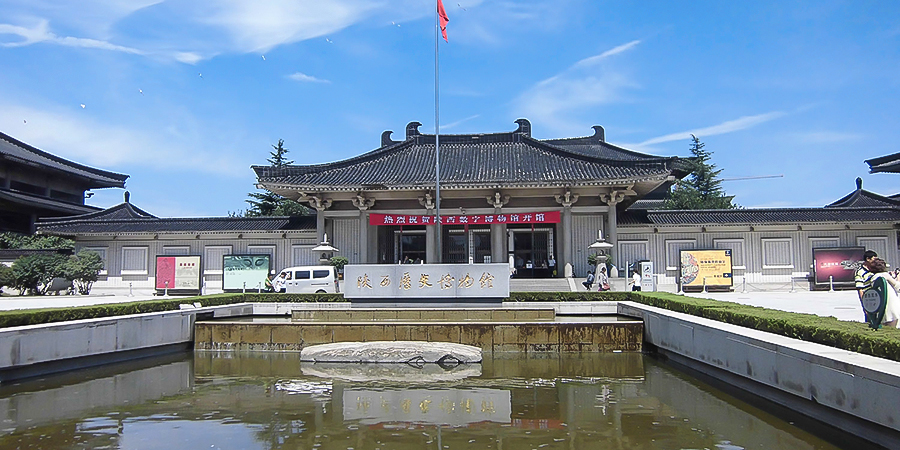
![]() Opening time for trial operation: 09:00 – 17:00, last entry at 16:00 and closed on every Tuesdays except public holidays.
Opening time for trial operation: 09:00 – 17:00, last entry at 16:00 and closed on every Tuesdays except public holidays.![]() Open Areas: Exhibition Hall of Qin & Han Culture
Open Areas: Exhibition Hall of Qin & Han Culture![]() Admission fee: free, enter without tickets during the trial operation
Admission fee: free, enter without tickets during the trial operation![]() Location: East Section of Lanchi 3rd Road, Qinhan New City of Xixian New Area, Shaanxi
Location: East Section of Lanchi 3rd Road, Qinhan New City of Xixian New Area, Shaanxi
![]() Further Reading: Xi'an History
Further Reading: Xi'an History![]() Recommended Nearby Attractions:
Recommended Nearby Attractions:![]() Giant Wild Goose Pagoda & Da Ci'en Temple
Giant Wild Goose Pagoda & Da Ci'en Temple![]() Tang Paradise
Tang Paradise![]() Qujiang Ocean Park
Qujiang Ocean Park![]() Qujiang Pool Park
Qujiang Pool Park![]() Cool Cave Heritage Park
Cool Cave Heritage Park![]() Great Tang All Day Mall
Great Tang All Day Mall![]() Recommended Tour including the visit to Shaanxi History Museum:
Recommended Tour including the visit to Shaanxi History Museum:![]() Top 10 Things to Do in Xi'an
Top 10 Things to Do in Xi'an







